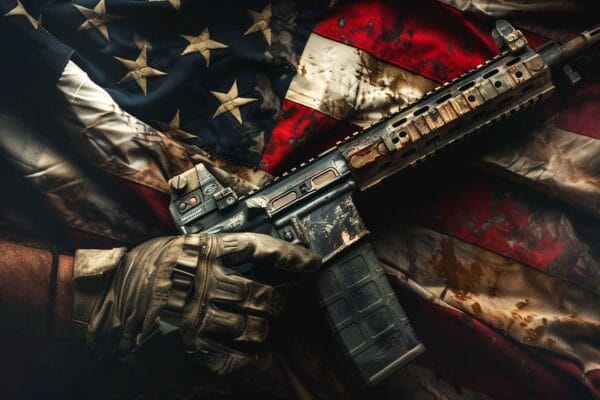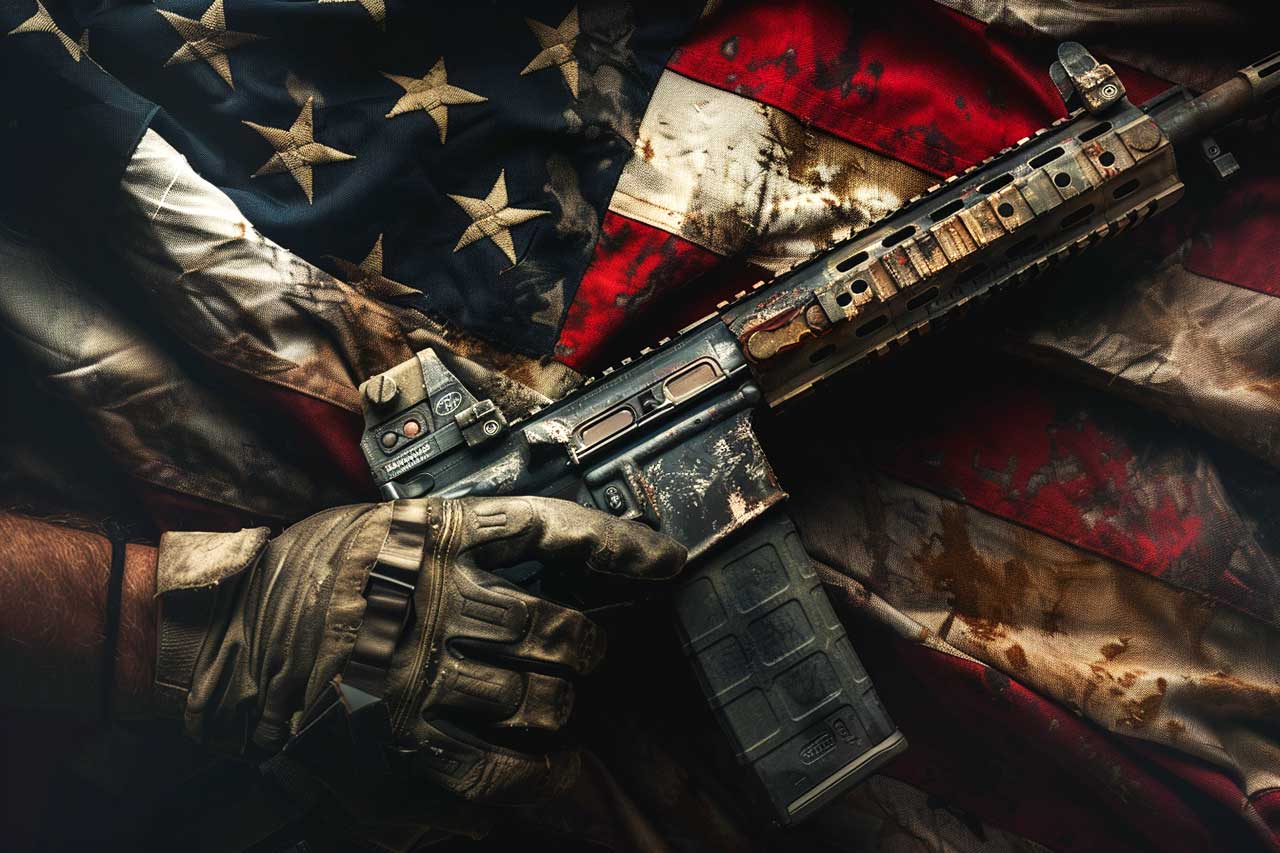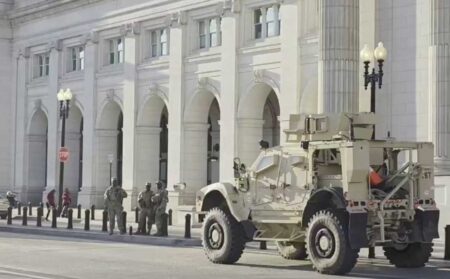Opinion

The U.S. gun industry is something special. While cars and gadgets got shipped off to cheap labor overseas, many gun makers skipped that chase, pumping out revolvers and rifles from factories in the good old USA.
But have you ever thought about why?
It turns out that regulations like the International Traffic in Arms Regulations (ITAR) played a huge role, acting as an early version of the protectionist punch that Donald Trump’s tariffs are now delivering. It’s not just about national security; it’s about keeping jobs and know-how stateside and making America great in manufacturing. Let me break it down for you.
ITAR: More Than Just Red Tape—It’s a Barrier Against Offshoring
ITAR kicked off back in 1976 under the Arms Export Control Act, mainly to stop bad guys from getting their hands on U.S. military tech. It covers stuff on the U.S. Munitions List, like firearms, ammo, optics, and the tech behind them—think blueprints and designs. If a company wants to move production abroad, they’ve got to export not just the guns but all that “technical data & the know-how to make them,” and that means jumping through hoops for licenses from the State Department.
This isn’t some quick paperwork—it’s a grind with months of delays, annual fees up to $2,250, and fines that can hit over $1 million if you mess up. Even sharing info with foreign workers here in the U.S. counts as a “deemed export” and gets scrutinized. It’s like a hidden tax on going global, making it smarter to build right here.
Sound familiar? That’s exactly how Trump’s tariffs worked—like slapping 25% on steel or 10-20% on Chinese imports to make foreign stuff pricier and push companies back home. Both crank up the cost of outsourcing, whether through regs or duties, so domestic shops win out.
Proof in the Pudding: How ITAR Saved the Gun Game
Look at our firearms world—it’s a prime example of ITAR doing its thing. Unlike autos or electronics that chased low wages in Asia, gun companies kept core ops in states like South Carolina and Wisconsin. Yes, some parts come from abroad to save a buck, but the heart of it—assembly, forging, expertise—stays American, thanks to ITAR and the related ATF rules blocking easy tech transfers without risking security breaches.
On the numbers side, ITAR has kept the defense base strong, stabilizing revenue in materials and tools by stopping tech leaks and saving jobs. It’s helped us lead in cool dual-use tech, like carbon fiber composites used in firearms, without handing it over to Chinese competitors. This vibes with Trump’s first-term tariff wins, like adding over 1,000 steel jobs by 2019 and sparking a manufacturing bounce-back.
Even Trump tweaked ITAR in 2020, moving many commercial guns to the lighter Export Administration Regulations (EAR) to cut fees and boost exports without gutting home protections. Smart move—hit enemies like China hard but let allies slide, just like his selective tariffs.
The Bigger Picture: ITAR as Pure Protectionism
Beyond defense, ITAR’s a straight-up economic fortress.
Yes, ITAR hits U.S. makers with red tape and costs when exporting. But here’s the flip side: those same rules make it tough for foreign gun makers to sell into the U.S. market. To ship ITAR-controlled firearms or parts here, foreign companies via their U.S. importers have to jump through the same licensing hoops and register with the U.S. government—an expensive, time-consuming process that many simply avoid.
The result? U.S. companies keep their edge, and the jobs stay here.
It creates a “buy American” vibe, shielding firearms from the globalization that gutted other industries. Sure, critics warn it might push some non-gun R&D overseas, but for firearms? It’s a win—companies skip the hassle and keep building and assembling stateside.
Trump’s tariffs are doing the same, fighting “unfair” trade to bring jobs back, even if they bumped up gun costs through pricier imported materials. Both got flak for higher prices, but the payoff? Long-term self-reliance. ITAR’s been proving this for decades, keeping our gun sector tough and American.
In the end, ITAR shows how smart government moves—dressed as security but packing economic muscle—beat blind free trade. It’s the blueprint that Trump’s tariffs continue to follow, favoring U.S. production and proving that protectionism works.
If it means more American-made ARs and fewer foreign knockoffs, count me in. What do you think?
Live Inventory Price Checker

|
M4e1 Upper Receivers Complete Threaded 5.56mm - M4e1 5.56 Assembled Upper Govt 18'''' Bbl Rifle Threaded Black | Brownells.com | $ 599.99 |
|

|
M4E1 Enhanced 18" 5.56 Rifle Length Complete Upper Receiver | Aero Precision | $ 665.00 |
|
|
|
PSA Complete JAKL Rifle Lower with Triangle Stock 5.56 NATO MOE EPT, Black | Palmetto State Armory | $ 329.99 |
|
|
|
PSA JAKL 5.56 NATO MOE EPT Complete Rifle Lower With JMAC Skeleton Stock, Flat Dark Earth | Palmetto State Armory | $ 399.99 |
|
America’s Firearms Industry: The One Industry That Never Left
From the Baltic to the Backyard: How American Gun Culture Inspires Global Innovation ~ VIDEOS






This is unintended consequences, and one of the few times the consequences were a small benefit rather than a disaster. Has it stopped foreign adversaries from getting our tech? Not a bit. I still have to sign the ITAR forms when purchasing NODs even after Biden left thousands of them for the Taliban. The USC 922 non-importation rules are an example that might help manufacturers, but they are not friendly to American gun buyers.
This is not “great policy” keeping guns made in America. It wasn’t needed till policy allowed all the other jobs to be sent off with “trade agreements”. Politicians ruined this with back door deals and greed getting kickbacks. All this started back in the 80s and the first signs of it that really set Americans off was Toyota and Nissans coming in to America. ITAR restricts sales wayyy more than it keeps businesses running here. The only thing tariffs are doing, in small business, is making things more expensive because there is no “made in America” alternative to purchase for… Read more »
“Yes, ITAR hits U.S. makers with red tape and costs when exporting.”
Imagine typing this and then spending the rest of the paragraph trying to sell everyone one how it’s actually a good idea.
Next, the author of this piece will be telling us how the Bush import ban and 922r are actually good things!
Unfortunately, the quality weapons are produced abroad. The Glock and Glock replicas alone have captivated the world. Why didn’t US weapons makers come up with that?
Who wrote this? Another puff piece about American made guns and accessories? Sure, there’s stuff made here. But how much? Savage’s cheap shotguns come from CHINA! Some or all of their rimfires from from Canada. Weatherby’s most popular rifle, the Vanguard is from where? Made by Howa, in Japan. Other than the Browning Buckmark, is there any Browning or Winchester that isn’t from either Japan, Portugal, or Turkey? Got a Glock? Some are made here, but most in Austria. Got a Sig (Self Inflicted Gunshot)? Most of the parts are foreign. Beretta makes a few shotguns and pistols here, but… Read more »
Hidden policy or not, we never should have sold out America for slave labor in other countries. China has us by the balls because we made our enemy rich just like the republicans said and they are trying to destroy us just like republicans said they would while the democrats said “no they will love us because we helped them in time of need”. And now, we have to deal with their pollution messing up the rest of the world and their politics siding with our other enemies to try and take over the world an destroy our dollar so… Read more »
ITAR has nothing to do with tariffs or protectionism for U.S. industries, it’s about reducing non-government sanctioned arms exports. An ignorant complete misread and misrepresentation of history.
I always buy American or anything other than Chinese when I can. Proof that democraps are anti America is that their car of choice is Subaru which is not an American made car and originates in Japan.
I would rather pay more for a Harley and have an oil slick in my garage than buy a rice burner and support another country because I have always believed in buy American because I am American.
NAFTA screwed us!
Make America Great Again.
Riehl doesn’t understand economics. The American gun market is chock full of foreign gunmakers and imported items; ITAR does not create a “buy American” vibe at all. Also, in no way is ITAR–an annual fee and penalties–the same as a tariff, which is an indirect tax on the consumers as a means of protecting inefficient manufacturers and bloated unions. You want to strengthen US national security? Have competition.